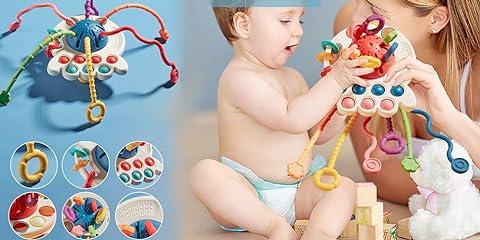In the world of child development, playtime is more than just a moment of entertainment; it's a critical period of learning and growth. The toys you choose when you buy toys for baby can significantly influence their sensory development and skill acquisition. This article delves into the importance of selecting smart toys that not only entertain but also stimulate the senses and enhance cognitive and motor skills.
The Importance of Sensory Stimulation
Babies are born with a limited understanding of the world around them. Sensory stimulation plays a vital role in their early development. It involves engaging a baby's senses - sight, sound, touch, taste, and smell - to help them understand and interact with their environment.
Visual Stimulation
Visual stimulation is crucial for developing a baby's vision. Toys with high-contrast colors, such as black and white patterns, can captivate newborns and help develop their eyesight. As they grow, introducing toys with a variety of colors, shapes, and patterns can further enhance visual processing skills.
Auditory Stimulation
Sound is another important sensory experience for babies. Toys that produce different sounds, such as rattles, musical instruments, and talking toys, can help improve auditory skills. These toys teach babies to differentiate between various sounds, which is essential for language development.
Tactile Stimulation
Touch is a primary way babies explore their world. Toys with different textures, like soft stuffed animals, rubber teething toys, and wooden blocks, can provide rich tactile experiences. These toys help babies develop their sense of touch and improve fine motor skills as they learn to grasp and manipulate objects.
Cognitive Development Through Play
Playtime is not only about sensory stimulation but also about cognitive development. Toys that challenge a baby's mind can foster problem-solving skills, memory, and concentration.
Cause and Effect Toys
Toys that demonstrate cause and effect, such as a jack-in-the-box or a pop-up toy, can teach babies that their actions have consequences. These toys encourage exploration and experimentation, laying the foundation for logical thinking and understanding sequences.
Sorting and Stacking Toys
Sorting and stacking toys are excellent for developing cognitive skills. These toys help babies understand concepts like size, shape, and color. As they try to fit shapes into corresponding slots or stack rings in order, they learn problem-solving and spatial awareness.
Puzzles and Shape Sorters
Puzzles and shape sorters are fantastic for developing hand-eye coordination and problem-solving abilities. These toys require babies to think critically about how pieces fit together, promoting cognitive development and fine motor skills.
Enhancing Motor Skills with Toys
Motor skills are divided into two categories: fine motor skills and gross motor skills. Both are crucial for a baby's overall development, and the right toys can help strengthen these abilities.
Fine Motor Skills
Fine motor skills involve the use of small muscles, particularly in the hands and fingers. Toys that require grasping, pinching, and manipulating can enhance these skills.
Building Blocks
Building blocks are a classic toy that can help develop fine motor skills. As babies grasp and stack blocks, they refine their hand-eye coordination and dexterity.
Bead Mazes
Bead mazes are another excellent toy for fine motor skill development. Moving beads along a wire path requires precision and control, helping babies improve their finger strength and coordination.
Gross Motor Skills
Gross motor skills involve the larger muscles used for crawling, walking, and jumping. Toys that encourage movement can help babies develop these essential skills.
Push and Pull Toys
Push and pull toys are ideal for babies who are learning to walk. These toys encourage movement and balance, helping babies strengthen their leg muscles and coordination.
Ride-On Toys
Ride-on toys are great for older babies and toddlers. They promote gross motor skills by encouraging leg strength and coordination as children push themselves forward or ride around.
Social and Emotional Development
Toys also play a significant role in social and emotional development. They can teach babies about relationships, empathy, and self-expression.
Dolls and Stuffed Animals
Dolls and stuffed animals can be a baby’s first introduction to social play. These toys can help babies learn about nurturing and empathy as they imitate the care they receive from adults.
Interactive Toys
Interactive toys, such as those that talk, sing, or respond to touch, can teach babies about cause and effect in a social context. These toys can also provide comfort and companionship, helping babies feel secure.
Conclusion
Choosing the right toys for your baby is more than just picking something fun; it's about selecting items that will aid in their overall development. Smart play involves toys that stimulate the senses, enhance cognitive and motor skills, and support social and emotional growth. By providing your baby with a variety of stimulating toys, you are setting the foundation for a well-rounded development.
Invest in toys that are not only entertaining but also educational, ensuring that playtime is a valuable and enriching experience for your baby. Remember, the best toys are those that grow with your child, offering new challenges and learning opportunities as they develop.

